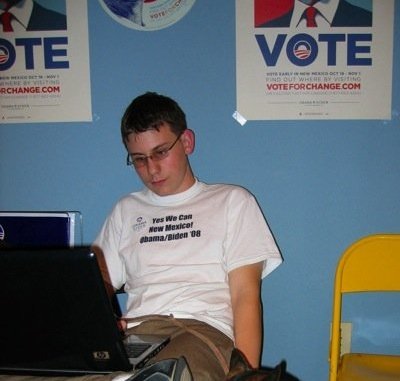Maybe it's a bit sick and cruel of me, but I really like the Wikipedia article on dating game shows. I am amused by the ease with which television and the willful self-humiliation entailed in appearing on such a show as the Dating Game or the Newlywed Game destroys "sacred" relationships between "soulmates." Perhaps there's some science behind this schadenfreude, and obviously, it's marketable. I think that at least part of the formula of these shows (one in particular, actually) could be adapted for use in elections.
Now for a nice anecdote: Last week, I was staffing the Democratic Party of New Mexico booth at the New Mexico State Fair, along with my parents and a few other members of the Jason Marks PRC campaign. We were registering voters and handing out buttons and stickers and pamphlets and things, and it was all great. Then, up comes this woman and she asks us if we have any Barack Obama signs or anything. We say "no, everyone in the entire state is out, including their headquarters." (Which is true, by the way.) The woman says that she really wants to go get something advertising Obama because she just overheard someone at the Republican Party booth say "I want to register to vote because I don't want a black man as President."
Well, at least he's got a reason, right? Anyway, this got me thinking, why should what someone looks like, or even what they sound like, or how old they are, determine if you vote for them or not? Unfortunately, that is a reality of American politics today, that is why Kennedy won the 1960 presidential debate, that is why the nomination of Sarah Palin (or even the thought of nominating Hillary Clinton) was so dramatic.
Can we design a better system? Is it possible to disassociate the person from the politics? I say we give it a shot. Tell both parties (or all of them, actually!) to come up with summarized platforms and then disseminate these platforms, through the press, through the schools, through any possible outlet, to the voting public. Then, come election day, each voter simply votes for the party, not the candidate, whose platform they most agree with.
I think this addresses several problems with the current voting process:
1. It eliminates (mostly) votes based upon physical appearance, race, gender, and other, non-policy-related criteria.
2. It has the potential to lower the amount of voter confusion on candidates' stances on issues.
3. It frees up the really charismatic people to go where we need them: dealing with other countries to patch up relations.
4. No more arguments over flip-flopping!
Conversely, it could also create a few problems:
1. Voters may not be able to rally passionately around a candidate (but doesn't passion blind judgment?)
2. It requires voters to educate themselves (I've already written about this. Basically, if voter's aren't informed in the first place, any decisions they make will be uninformed, also, and, in my eyes, invalid).
Personally, I think that having charismatic leaders is great, but a person should not be elected because they are charismatic. A party should be elected because of its stances on the issues, then charismatic officials should be appointed because they are charismatic and it's a job requirement for many positions. Voters should not base their opinions on appearance.
P.S. Maybe politicians should write anonymous blogs on their positions. They could hold Q and A sessions virtually. Ahhhhh, the possibilities unlocked with the internet....
Sunday, September 7, 2008
The Election Game
Labels:
appearance,
dating game,
democratic,
elections,
personality,
republican,
united states
Subscribe to:
Post Comments (Atom)


No comments:
Post a Comment